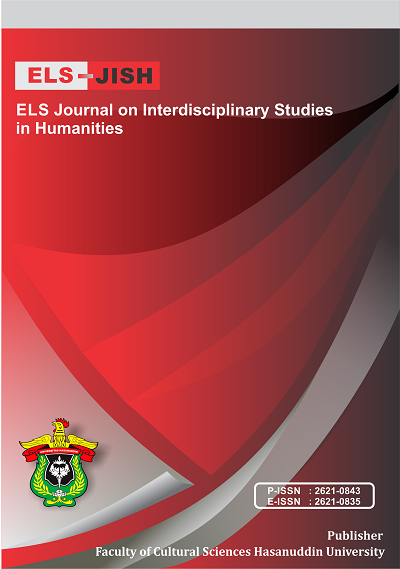The Impact of Slang Language Used By “Gen Z” On The Existence of Indonesian Language
DOI:
https://doi.org/10.34050/elsjish.v6i3.28464Keywords:
Indonesian Language, Slang, Social MediaAbstract
Social media is enlivened by young people and does not rule out the possibility of the elderly enlivening it. Not only that, the creativity shown by young people in this era of modernization also gives rise to language variations that are varied from the standard or correct language in terms of grammar, but are made simpler, shorter, so that what is called among young people is slang.This research aims to find out the impact of Language Slang used by “Gen Z” towards the existence of Indonesian language; The research method used by researchers is descriptive qualitative research method. This research uses data collection techniques with documentation, listening and recording which is sourced from social media such as, Twitter, WA, and TikTok. The result shows that slang have an impact on enriching and expanding the vocabulary of the Indonesian language. On the other hand, the bad impact of the use of Slang are Indonesian is in danger of being replaced by slang, decreasing the degree of Indonesian, causing the extinction of the Indonesian language. Some terms or slang can become popular and widely used by the community so that they become part of the broader Indonesian language. So it is very importance to balance the use of slang with the ability to use good and correct Indonesian in a formal or professional context. This can also be done by improving understanding of grammar rules as well as learning to use more appropriate and standardized vocabulary in formal situations.
References
Anindya, W. D., & Rondang, V. N. (2021). Bentuk Kata Ragam Bahasa Gaul di Kalangan Pengguna Media Sosial instagram. Prasasti, Journal of Linguistics (PJL), 6(1).
Baía Reis, A., & Ashmore, M. (2022). From video streaming to virtual reality worlds: an academic, reflective, and creative study on live theatre and performance in the metaverse. International Journal of Performance Arts and Digital Media, 18(1), 7-28.
Idris, M., Willya, E., Wekke, I., & Mokodenseho, S. (2021). Peace resolution in education and application on information and communication technologhy. International Journal of Advanced Science and Technology, 29(6).
Kurniasanti, K. S., Assandi, P., Ismail, R. I., Nasrun, M. W. S., & Wiguna, T. (2019). Internet addiction: a new addiction?. Medical Journal of Indonesia, 28(1), 82-91.
Lambert, V. A., & Lambert, C. E. (2012). Qualitative descriptive research: An acceptable design. Pacific Rim international journal of nursing research, 16(4), 255-256.
Partelow, S., & Nelson, K. (2020). Social networks, collective action and the evolution of governance for sustainable tourism on the Gili Islands, Indonesia. Marine Policy, 112.
Rahman, F., & Amir, P., Tammasse. (2019). Trends in Reading Literary Fiction in Print and Cyber Media by Undergraduate Students of Hasanuddin University. International Journal of Education and Practice, 7(2), 66-77.
Rahman, F. (2018). The Constraints of Foreign Learners in Reading English Literary Works: A Case Study at Hasanuddin University. Journal of Arts and Humanities, 7(2), 01-12.
Rosyadi, Z. A, Dede., Zulkhaeriyah, Udin, Imran T. (2023). Code Switching and Code Mixing in Speech Act between the Seller and the Buyer. ELS Journal on Interdisciplinary Studies in Humanities, 6(1).
Sarupuri, B., Kulpa, R., Aristidou, A., & Multon, F. (2023). Dancing in virtual reality as an inclusive platform for social and physical fitness activities: A survey. The Visual Computer, 1-16.
Shareef, M. A., Dwivedi, Y. K., Wright, A., Kumar, V., Sharma, S. K., & Rana, N. P. (2021). Lockdown and sustainability: An effective model of information and communication technology. Technological Forecasting and Social Change, 165, 120531.
Siregar, I. (2021). The Existence of Culture in its Relevance to the Dynamics of Globalization: Bahasa Indonesia Case Study. International Journal of Cultural and Religious Studies, 1(1), 33-38.
Sugiyono, (2008). Metode Penelitian Pendidikan. Bandung: Alfabeta.
Downloads
Published
How to Cite
Issue
Section
License
Copyright (c) 2023 Zulkhaeriyah, Dede Rosyadi ZA, Tri Pujiati

This work is licensed under a Creative Commons Attribution-ShareAlike 4.0 International License.






